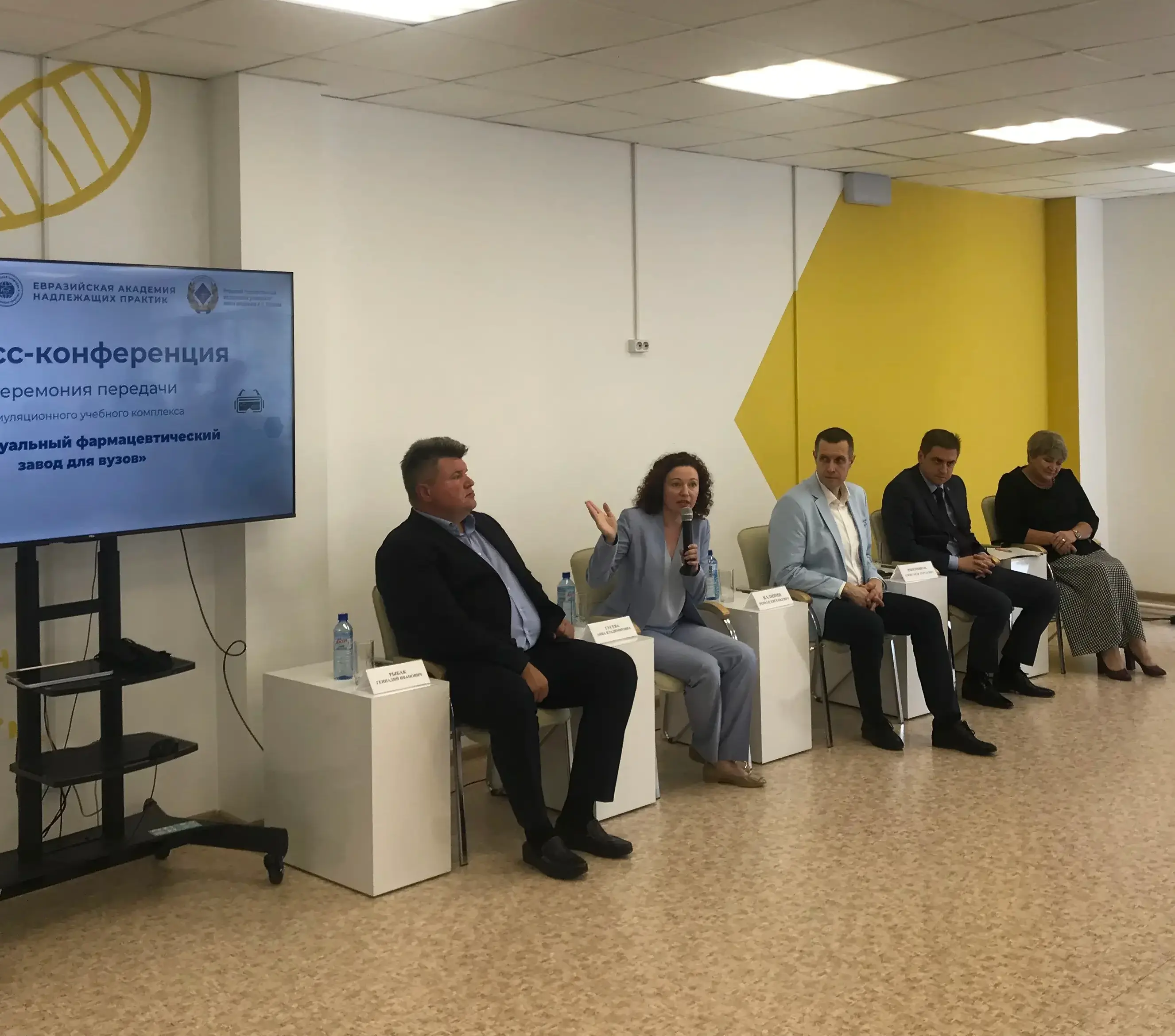Socially-oriented Business Advancing Professional Training: EAGP & Skopinpharm Equip Ryazan Medical University with VR Pharma Factory

VR Pharma Factory for Universities is a simulation-based learning solution developed by the Eurasian Academy of Good Practices together with the State Institute of Drugs and Good Practices of Russia’s Ministry of Industry and Trade. Recent implementation of VR Pharma Factory at Ryazan State Medical University was funded by Skopinpharm. All the parties involved in the project agree that the initiative is crucial for the industry. It sets an example for other companies that are also interested in raising the level of training of future professionals.
The press-conference held to mark the occasion featured the leadership of the relevant ministries of the Ryazan Regional Government, Skopinpharm, the Academy, and the University. Assoc. Prof. Dmitry Oskin, Candidate of Medical Sciences and Dean of Pharmaceutical Department, moderated the event.
The opening remarks were delivered by Prof. Roman Kalinin, Doctor of Medical Sciences and Head of Ryazan State Medical University. ‘In education, it is extremely important to keep abreast with the times and to make sure teachers and students have access to cutting edge technology. This makes VR Pharma Factory a good example of innovation in education. For us it is an opportunity to equip our teaching staff with relevant competencies and to enhance our students’ learning experience with the much needed hands-on training’, said Roman Kalinin.
In a VR Pharma Factory for Universities promotional video, Prof. Irina Spichak, Doctor of Pharmaceutical Sciences and Executive Director of the Eurasian Academy of Good Practices, explained that VR technology helps apply hands-on approach to teaching students and develop valuable skills required for their future jobs at pharma companies. As part of the project, Ryazan State Medical University will receive licensed software and the training materials that come with VR Pharma Factory for Universities. The package includes all the necessary in-depth training materials based on GMP requirements and internal regulations of enterprises, test assignments for continuous control and final assessment in VR, over 60 case studies with analysis of specific production cases, seven VR business games, an internship diary (workbook), and detailed teaching guidelines for every day of training.
As a follow-up to the presentation, Anna Guseva, the Academy’s Deputy Executive Director for Development, highlighted the importance of the tasks that the industry is facing today. First of all, these include boosting the production of medicines, substituting imports and ensuring the country’s sustainable drug supply. ‘In order to do that, we need competent specialists. These future professionals are now in their final years at the university, and already in two–three, maximum four years they will have to deliver this important breakthrough’, explained Anna Guseva. ‘The industry is experiencing a serious lack of staff, and pharma companies are in urgent need of skilled employees to take up a whole range of responsibilities. As an institution of professional education, we clearly understand the needs of pharmaceutical enterprises. We see how eager they are to hire bright students who have so much knowledge but are not always equipped with all the required professional skills. Everyone agrees that you cannot acquire the whole set of them at the university, since not enough hours are dedicated to hands-on training, and internships are subject to strict regulations and other constraints. This is where VR technology can prove useful as it helps lift all the barriers and get students 100% ready for their future jobs. In developed countries, more than 30% of educational institutions that train pharma students are increasingly using simulation-based training, including VR (or digital technology). These learning solutions are being actively introduced at Russian universities as well’, she clarified.
According to Alexander Pshennikov, Minister of Health of the Ryazan Region, the pharma industry has been changing rapidly in the region, and the contribution of Skopinpharm deserves particular recognition. ‘We all see how fast the factory is growing. The region produces a great amount of medicines, especially cancer drugs, and develops manufacturing of blood products. The factory is carrying out its project to create a blood plasma center, a plasma warehouse is being constructed, and a blood product manufacturing facility is being built’, said Alexander Pshennikov. ‘On the whole, the pharma industry is expanding at full speed, and new educational technologies will advance its growth even further. Digital technology allows students to adjust to production while they are still at the university. The main goal of education is, indeed, to serve the industry, and to boost the competitive advantage of future professionals. And I am sure that for pharmacy students the future looks bright’, he added.
Nina Solomonova, First Deputy Minister of Economic Development of the Ryazan Region, emphasized the importance of developing the industry in the region, and spoke about cooperation between businesses and the state in major projects on establishing new production. ‘Given the lack of skilled staff, if every company works closely with the relevant universities, we could create a foothold for accelerated growth of the industry’, assured Nina Solomonova.
Gennady Rybak, Executive Director of Skopinpharm, believes that with the current development of hi-tech pharma manufacturing, it is even more pertinent to train students who could meet the industry’s needs. That is why the company supports the creation of new learning solutions that allow students to experience the production process itself. A fast-growing enterprise, Skopinpharm has entered into two special investment contracts, and its need for staff is urgent. With its production based in the Ryazan Region, the company has been building a close partnership with Ryazan State Medical University. That includes internships, hands-on training and, eventually, employment opportunities. ‘And that is exactly what VR Pharma Factory is all about: it equips future specialists with relevant professional skills and significantly shortens the time they require to adjust to their jobs once they get hired’, pointed out Gennady Rybak.
As someone already familiar with the VR solution, Assoc. Prof. Dmitry Oskin, Candidate of Medical Sciences and Dean of Pharmaceutical Department, shared his thoughts. ‘Starting from this academic year, all pharma students at Ryazan State Medical University will have their industrial pharmacy internship with the help of VR technology’, he said. ‘The innovative simulation-based training facility allows students to immerse themselves in the production environment of a pharmaceutical enterprise and study the main manufacturing processes in detail. By introducing students to digital twins of real-world equipment and its operation, it develops their practical skills at different stages of solid dosage manufacturing, and provides a comprehensive understanding of today’s pharmaceutical production’, concluded Dmitry Oskin.
When the speakers left the stage, Ryazan State Medical University, Skopinpharm and the Eurasian Academy of Good Practices signed a three-party partnership agreement, after which the University was granted a certificate for the use of the VR training facility.



